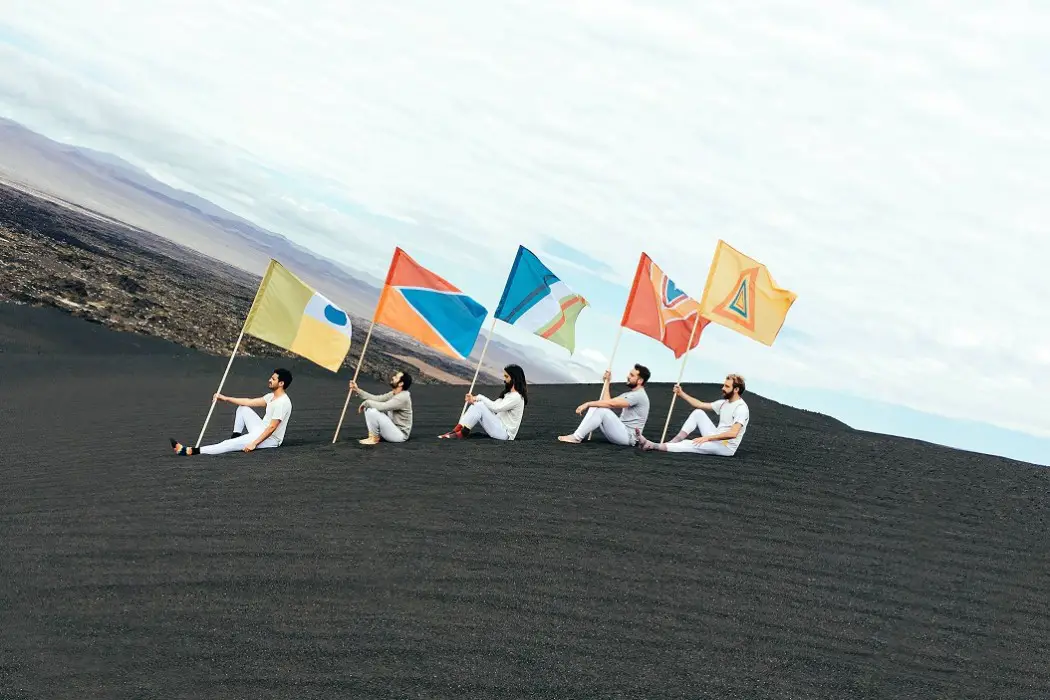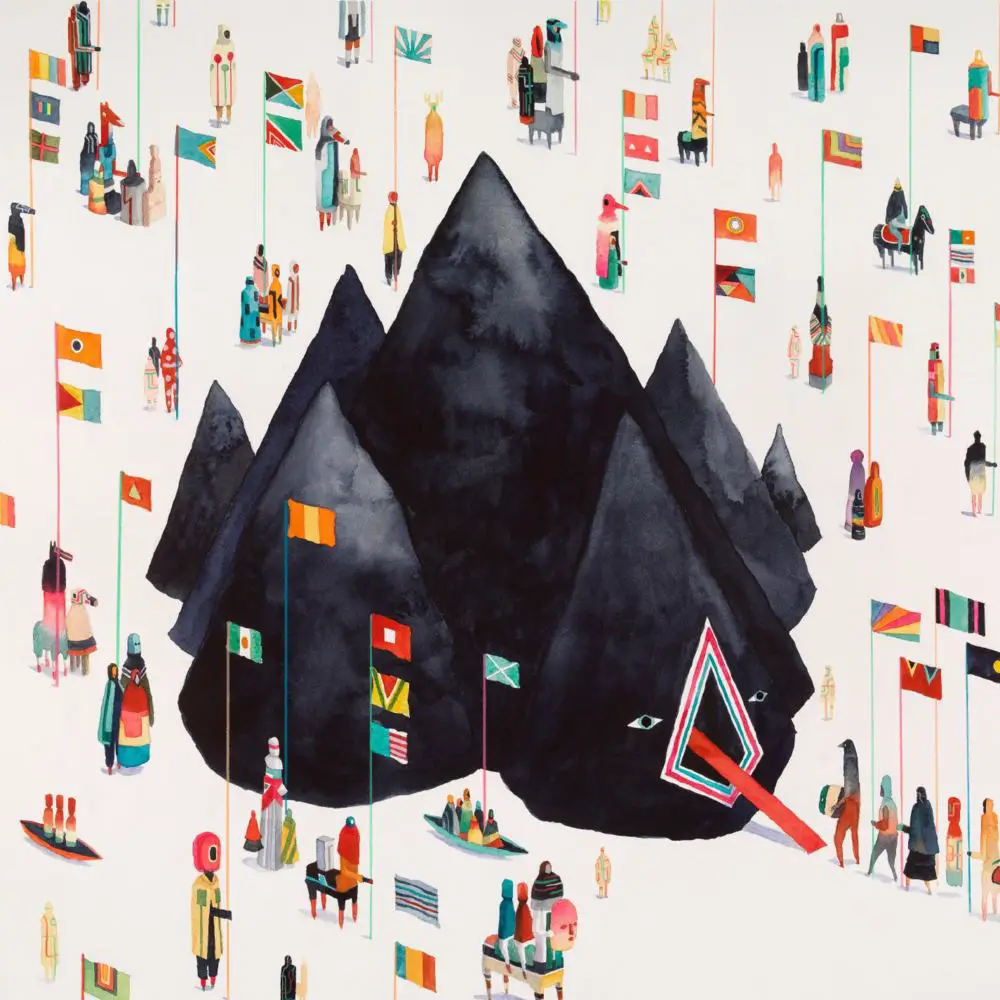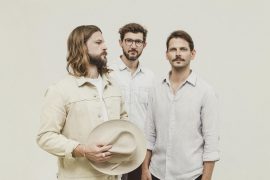Young the Giant’s Sameer Gadhia discusses the context, experiences and influences leading up to the band’s third album, Home of the Strange.
— —
Understanding identity is more relevant and important now than perhaps ever before. The “home of the brave,” as Francis Scott Key called it, is and has always been a melting pot of sorts. People from different backgrounds, with distinct cultures, ideologies, languages, values and practices, settled next to one another in order to make a better life for themselves and their families “in America.” That picturesque unity is still a dream; while it looks good on paper, our society has a long way to go. Now is a time for tolerance – of recognizing and accepting both our similarities and our differences; of finding ways to connect. Then, and only then, will this country truly live up to the name the “home of the brave.” For now, we more closely resemble the land in Young the Giant’s third album, Home of the Strange.
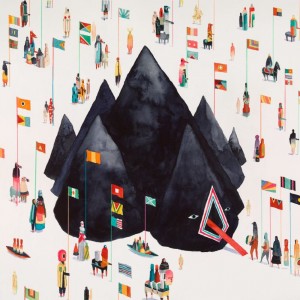
Released August 12 via Fueled By Ramen, Home of the Strange is Young the Giant’s most ambitious work to date, a journey through self-identity and an exploration of the sonic landscape unlike anything the California rock band have previously attempted.
The ‘indie rock’ group, who can trace their popularity back to the commercial success of songs like “Cough Syrup” and “My Body” off their eponymous debut album in 2011, have come a long way in only five years’ time. The music on Home of the Strange is at once more refined and more aggressive: Lead singer Sameer Gadhia’s sweeping, belted-out melodies and delicate falsetto take center stage, enhanced by a collage of keyboard synths, acoustic and electric guitars – sometimes singled out and intimate, other times together and forceful. No two songs sound particularly alike, lending to the album a less cohesive feel than the band’s first two records, and yet the brilliance of Home of the Strange is how fluidly its vibrant collection comes together to form a single holistic entity.
That unity may, in part, be due to a common story-line threaded gently throughout the record. Home of the Strange is a subjective retelling of the immigrant’s story – an important theme to all five band members.
Fit snugly into the center of the record, “Titus Was Born” is the first song Young the Giant wrote for Home of the Strange, the story of traveler in search of home. “We started thinking of this character of Titus, and how he was the main person that all this stuff had happened to, and I think it kind of rolled from there,” recalls Gadhia. In that sense, Home of the Strange is far greater than the sum of its parts. For example, lead single “Amerika,” previously featured on Atwood Magazine, is a simultaneous reminder and critique of the country’s story: That the ever-elusive fairytale “American dream” that’s comforting to talk about is nonetheless as fraudulent today as it was two hundred years ago. To Titus, that song and its story represent the new and the unknown, hope and fear, success and failure.
Our story identifies with a lot of people out there, whether that’s the immigrant, or the American, or the disillusioned traveler trying to find a place to call home.
– Sameer Gadhia
[youtube=https://youtu.be/m_ZRWZv14SA?t=0s]
[youtube=https://youtu.be/NytGzDhMnA0?t=0s]
But that’s just one interpretation. “We wanted people to take their own thing from [this album]…. Everything is filled with duality,” explains Gadhia. Home of the Strange can be whatever you want it to be: A collection of killer rock anthems, driving jams, and hauntingly sweet ballads; a protest; a cheer. Alternatively, it can be all those things and more.
Young the Giant remain one of today’s premier rock acts, cementing their claim with a third record that resonates with emotion and energy, while also sparking an important conversation that we should all be having right now, with ourselves and with friends and family: Identity in America. What do our differences mean, and how can we overcome them in order to come together? Atwood Magazine spoke with Young the Giant’s Sameer Gadhia about the surrounding context, experiences and influences leading up to Home of the Strange. Dig deeper into Young the Giant’s third release below, and don’t miss them on tour this fall.
Home of the Strange – Young the Giant
A CONVERSATION WITH YOUNG THE GIANT
Atwood Magazine: Great to meet you, Sameer! Where are you right now?
Sameer Gadhia: Nice meeting you too, over the phone. I’m in Nashville for rehearsals for the tour.
First of all, congratulations on the release of Home of the Strange!
Gadhia: Thank you, yeah it’s finally out.
How does this album's release compare to that of Young the Giant and Mind Over Matter?
Gadhia: You know, every album is different, and it kind of reflects the musical environment of where we are. I remember during Young the Giant when we were releasing the first album, Spotify was barely a thing. It kind of happened halfway through the cycle. Most people were illegally downloading, and some consciousness people were using iTunes to buy the singles. So it’s different! By the second album, streams had become an important thing, but no one really knew where it was going. It was a very interesting time, because it was like the “Wild West” of new marketing strategies. Now this time, streaming is everything! It’s been interesting – you know, we aren’t that old; this band has only existed since 2010 in terms of our actual album releases, but nowadays the musical generations are going so quickly. That landscape is completely different between a year or two from now. We decided to share a lot of this album beforehand, and I think that was a smart decision for where we find ourselves now.
It constantly feels like a brave new world.
Gadhia: I really do think that now, it’s mostly streams. Streams are great! They’re so utilitarian in some ways; it allows people to really choose what they want to listen to, and it allows for everyone to be a part of the conversation of what’s happening in music. At the same time, you’re kind of lost in a sea, and that’s why we feel lucky to be where we are already! Something we think about is if we had started the band now, how much harder it would be! It’s just very difficult, and I think rock music at this point… You know, there are a few bands who are trying to continue to champion that. It’s moving very far to electronic and dance music and pop music – which is great; I don’t mind that stuff! – but rock music is kind of hanging on by a thread right now, and it’s going to take the collective effort of all the rock bands out there to keep the genre alive.
Rock music is kind of hanging on by a thread right now.
Do you feel some responsibility there? Is Young the Giant trying to bear some of that burden, as a current rock band?
Gadhia: I just think that we’re very lucky to have the platform that we have, and to be able to inform the listener on our musical choice – our musical journey – and still keep it in that rock world. That’s all we can do; I know that there are tons of musicians out there who are bigger than us, like our contemporaries that are doing the same thing, and just sticking together and supporting one another.
At the same time as technology has changed, Young the Giant's music maintains its integrity. And you're still going by the album format.
Gadhia: Yeah, I mean I think we still believe in it. I think that comes from maybe just being ideological, or… just coming from a different time. We can afford the ability to have that. We know that we have fans who will listen to the whole thing. We’ve already started a narrative and a conversation with some people now for several years, so we can do that, and that’s what’s so amazing! It’s been a singles market now for awhile, but we’re very stubborn, and I think hopefully it’s paying off.
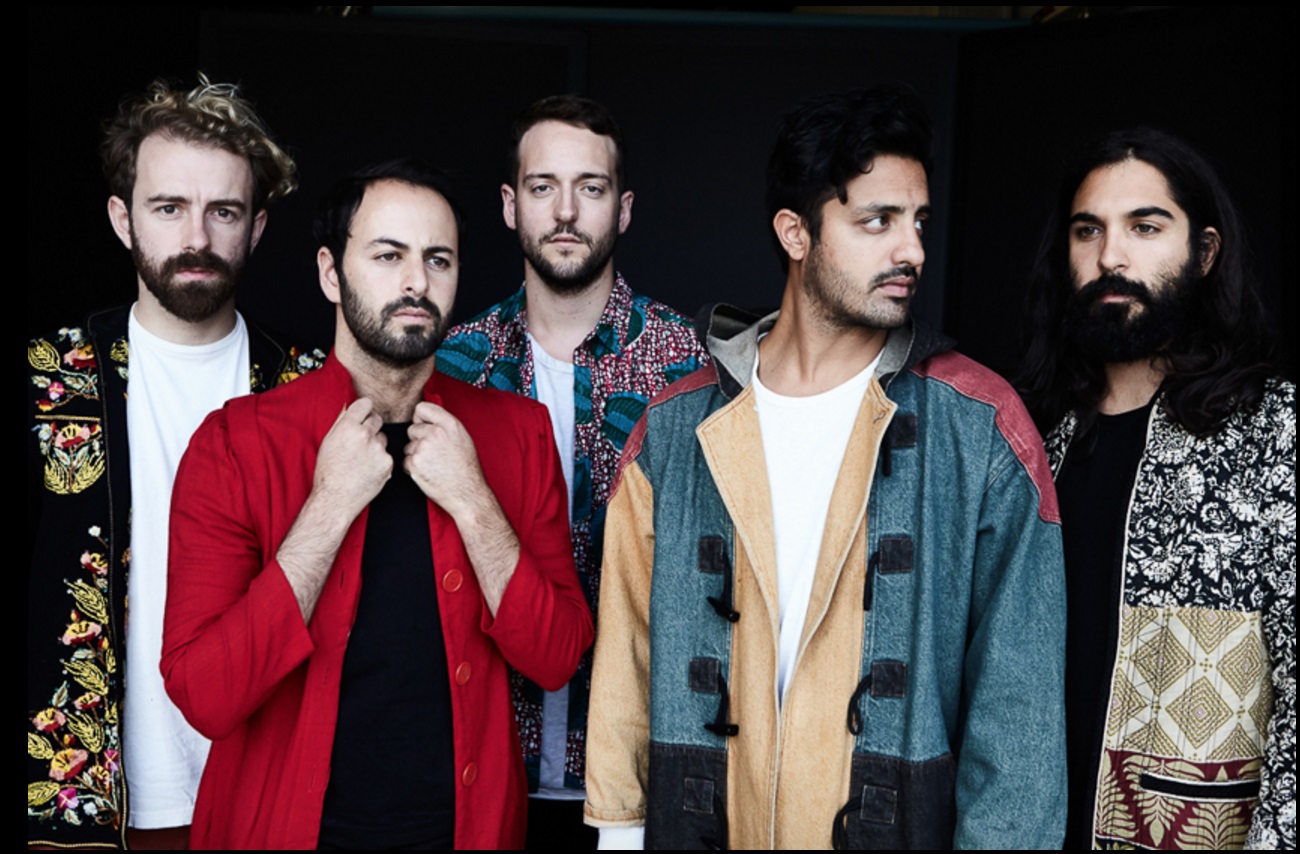
I feel like there's something different about the third album. What was the mindset going into this third cycle?
Gadhia: I think we just felt humbled… You know, we’d kind of just been propelled forward by some unknown force over the previous two albums. It’s the life of a travelling, touring musician… We weren’t only just recording; we were playing all over, and really trying to get our bearings. I think finally, after the second album cycle was done – I think the end kind of was when we were on tour with Kings of Leon; I think that was the very end of 2014 – that we felt a little bit more relaxed. At the end of the day, we just wanted to continue to write the best music that we could, and that was it! We somehow managed to keep all the noise out the door, and that’s a lot about what Young the Giant is: The name, in itself, is just that youthful ability to have confidence and believe in what you’re doing, even though you’re completely disconnected from other peoples’ expectations, or what the world expects of you, or what you’re supposed to do fit in, or whatever. I’m just really proud of our ability to do that, and kind of be in our own world. That’s kind of what we did for a long time – we lived that album for two years. I’m excited… I feel like we’ve birthed something now, so it feels great.
(Young the Giant) is… that youthful ability to have confidence and believe in what you’re doing, even though you’re completely disconnected from other peoples’ expectations.
It's interesting that you talk about how you were able to put yourselves in a bubble, because so much of this album is about self-identity.
Gadhia: Most definitely. The great thing about this band is that we all write everything together. We share the load, and every time we write, we have a slightly different process. I think the narrative of the five of us allows for things to be collaborative – to go beyond what you would have done by yourself – but yeah, it is insular: It’s our story, but at the same time we know that our story identifies with a lot of people out there, whether that’s the immigrant, or the American, or the disillusioned traveler trying to find a place to call home. I think that that constant search, especially at our age, is prevalent, and in modern times, I think a lot of people feel lost and unsure of where to rest their feet.
I find a dichotomy on the album between appreciation and love for this country, but at the same time total disillusionment and a jaded sense.
Gadhia: Yes. I think that’s what we wanted to go for. It’s not necessarily objective reporting. We wanted people to take their own thing from it. “America,” in itself, is this living, breathing thing. It’s multiple dimensions: It’s the process of time over all these different effects, catalysts that have happened. It’s an amazing place full of contradiction, and that’s sometimes what makes it the most bizarre place ever, and it’s what makes it truly real. Everything is filled with duality – there’s always duality in everything. I’m always thinking about, you know, I brought a little bit of Hindu philosophy to the idea of ever knowing anything. You can’t really ever know anything: Your opinion is just your opinion. It’s not the truth, and I think we’re all limited by the senses that we have to only show what we know, and that’s being as honest as possible to the experience and not having to play sides.
“America,” in itself, is this living, breathing thing.
So the recording process for Home of the Strange started in early 2015?
Gadhia: Actually some of it had started while we were on tour with Kings of Leon at the end of 2014. We were just going around in studios when we had days off. The great thing about touring with a huge band like Kings of Leon is that they have a very… “cushy” schedule. It’s pretty great. We’d play like three shows a week, and then we’d find ourselves having three or four days off, so we figured we might as well get into the studio, instead of talking about it. Even though it’s actually kind of embedded in the middle of the album, “Titus Was Born” was the first song that we wrote for the record. It really made sense – that really stuck. We started thinking of this character of Titus, and how he was the main person that all this stuff had happened to, and I think it kind of rolled from there.
Watch: “Titus Was Born” – Young the Giant
[youtube=https://youtu.be/2sL1f9Q25sM?t=0s]
I love the duality - the misspelled 'Amerika' and the 'Home of the Brave' wordplay. It ties everything together: Before you even listen to the record, you sense these sociopolitical undertones.
Gadhia: It’s funny how now it’s become even more political – not necessarily the album itself, but just the idea: The story of “opinion.”
I feel like Young the Giant took more risks this time around. Do you feel that way?
Gadhia: I do, and I don’t. I think we’ve always tried to take those risks, and we just grow every time. We just became more elegant with the moves that we wanted to make. You can see some of those things in the seeds of what we did on the extended album for the first record, some of the B-sides, and kind of even on unreleased demos of the second album. I think for us, those risky, left-field moves have always felt like the more comfortable thing to do. We don’t like sitting in the same place for too long, and that’s I think something that hopefully people will take away from this band after understanding the whole catalog and continuing to follow us down the path that we’re going.
I'd say if anything, Home of the Strange is the least cohesive record that you've made, which makes it feel that much more honest.
Gadhia: Thank you.
How did you approach the acoustic instrumentation on “Titus Was Born” and “Art Exhibit”? That feels like something new.
Gadhia: Acoustic [music] has always been a big part of who we are from a really young age. I grew up with a lot of Elliot Smith, Nick Drake, and even Bon Iver – those guys are still doing it right now – and I love that folk tradition. For me, some of the songs I write personally, like “Art Exhibit” I wrote when I was on tour… It kind of feels natural! We have the In The Open series that we’ve been doing now since the beginning of the first album, with all the acoustic renditions. We wanted to show that more, and I think when people come to our live show now, they’ll get a better chance to see that. We’re going to try and do a little “In The Open” set embedded in our live electric set.
Watch: “Art Exhibit” (in the open) – Young the Giant
[youtube=https://youtu.be/p11XD7Zhw4U?t=0s]
Some of the best love songs are also on this album.
Gadhia: We’ve always had, or at least for me lyrically, a lot of struggle writing a love song. I think it’s a good thing – it’s interesting. Like, from the first album, “My Body” and “Cough Syrup.” Those songs are not love songs, you know? And “Mind Over Matter,” to a certain extent, may be construed as one, but it isn’t. But I think with “Mind Over Matter,” I was really trying to tackle that beast of writing a love song. I think I felt more comfortable with it this time, and more comfortable with the layers you can have in a love song. At the end of the day, love is really the most universal thing that everyone can feel. There’s something extremely important and significant about that; it’s not just drivel. If you do it in a unique way – that’s unique to you, at least – then it’s a real part of you. You’re not just saying “I love you, you love me.” It’s more about the experience, and how some of it’s different, and how some of it’s maybe the same.
What is the album's highlight, for you?
Gadhia: I don’t know! It really changes – like, we were all extremely excited about “Amerika” when we were first done with the album, and that’s what we really wanted it to be the first release. We still are excited about it, but now we’ve gotten used to it because it’s been existing in the world since the beginning of this year! So my attention is moving towards those songs that have just now released. I enjoy “Elsewhere,” I like “Art Exhibit,” I think “Nothing’s Over” is fun, “Mr. Know-It-All” – there are a few of them. I’m just excited for the whole thing! And then see, I’m going to get tired of it all, which always happens.
Which means it's time to make more music.
Gadhia: Yep!
Watch: “Amerika” – Young the Giant
[youtube=https://youtu.be/8P1utNegyt4?t=0s]
Your catalog is more expansive now. What do you find, from the first album, that you love going back to?
Gadhia: Man, it’s great! We’re here for rehearsals, and we just wrote down all the songs that we have. We’re so completely surprised by the sheer size of our catalog! Now, I think I’m getting more excited by the idea of taking some songs that we haven’t played for years. There are obviously those songs that we call the “revolt songs,” that if you didn’t play them, it would be like what the hell? – but we love sprinkling in tracks that we don’t really play that much, as well as alternate renditions or arrangements of the songs and some of those B-sides. I’m really excited to actually incorporate “Guns Out” from the first album now. It’s cool to see this, like almost stepping away: There’s a lot of similarity to “Amerika” and “Guns Out.” It’s that same aesthetic that we were trying to find, and you can see the general course of where it went. From “St. Walker” on the first album, which went to “Paralysis” on the second, and now is “Elsewhere” on this third album, you can see the inklings of some of these things. It’ll be interesting to play some of the old stuff, and also really weave it into the set so it becomes a more lucid conversation between all the albums.
Are you going to try to update some of those songs to make them fit into the Young the Giant of 2016?
Gadhia: I don’t know. There’s always a battle, because you could always do that. We are going to do alternate arrangements, but we’re really going to try and step outside and be honest about the song and what that song needs or doesn’t need, and where we were when we wrote it. We’re not going to get, like super heavy synthified on anything from the first album, because that’s just not true to those songs. It really depends, and we’ll try and respect the space around the songs.
How do you decide when and where to break into falsetto?
Gadhia: That’s something that I’m still trying to figure out. I can belt stuff most of the time, but there’s something… just personally for me, when I think about touring on this, I’m going to have to sing this every night, and I need to be able to hit it every night. (laughs) That comes into play a little bit, but I think a lot of it is also basically what the song needs. What type of touch does it need? Does it need me blaring, or does it need me yelling? Do I need to be more emotive, or is it something a little bit more elegant? Accordingly I’ll change into where I want to go with it.
So this is Titus' Home of the Strange?
Gadhia: Yes (laughs)
Is Titus an immigrant?
Gadhia: Yeah, to a certain extent. Titus is kind of borderless… He’s in this in-between space, and I think that’s very accurate to what I feel. I was born in America, but my parents are immigrants; they came here and they had a lot of Indian friends. When I was younger, I learned a lot about Indian culture and I went back to India a lot. I couldn’t really identify with some of my American friends, especially when I was younger, but then when I’d go back to India, I couldn’t necessarily identify with them either, because I felt like an outsider. Everyone knew that I wasn’t from there, so there’s like this in-between place, and I think that fits Titus pretty well.
Titus is kind of borderless… He’s in this in-between space.
Did the story of Titus inspire the songs, or did the songs inspire Titus?
Gadhia: I think the song ended up inspiring Titus for that one. A lot of the times we’ll start with the sonic landscape… I think I just kind of hit a switch in my head, I remember we were working on the guitar line, and Eric had come up with that acoustic part. I was like, “Wait a second, I know exactly what I’m going to do.” I heard it, and I ran upstairs and I wrote pretty much all the lyrics within the span of thirty minutes. Simultaneously, the other guys had figured out a chant line that was really in line with what we had already been envisioning, so it just kind of came together.
Titus was born
Under the eye of a storm
Rainwater carried his bed
Around the world and back again
Oh, all the things he had seen
Life is a dream
Drifting at sea
It’s so hard to believe
And so, Titus would grow
Taller and strong as an oak
Rainwater stuck in his head
It filled him with words left unsaid
Of all the things he might be
Drifting at sea
At night he would dream
Of all stumps at bay
To wash the pain away
Rain’s falling
Falling on you
– “Titus Was Born” by Young the Giant
As a first-generation American born to Indian immigrants, your background has given you a unique window. You've been touring the world for the past four to five years now, and you've seen a lot of this country. How has your experience changed? How has your identity changed?
Gadhia: I think I’m just more aware. In a good or bad way… I always felt very close to my culture, and I give major props to my parents for not wanting to whitewash themselves. With some Indian people, it’s either one way or the other: They want to completely rid themselves of their Indian heritage, or they only live in that and can’t see the American side of it. My parents were really good about dancing that line, but when I grew up… I grew up in Irvine, which is a melting pot of these different ethnicities, and actually a lot of immigrants. At the end of the day, these parents are coming here so that their kids can have good schools. So we’d go there, and there were a lot of kids from everywhere, so I did not necessarily feel different. Then I went to school at Stamford, which was a very liberal school… I could still, at that point though, I did know. There are going to be those kids who are going to look at you a little bit differently because you’re not like them. Those are the kids from the South, or from New England, who are just not used to you being around. Then, I think when we traveled a lot, we could really see that! Especially in America, we’re going everywhere. We’re not just going to the big cities; we’re going to those little towns. We’re going to Jonesboro, Arkansas; we’re going to Birmingham; we’re going to all these places!
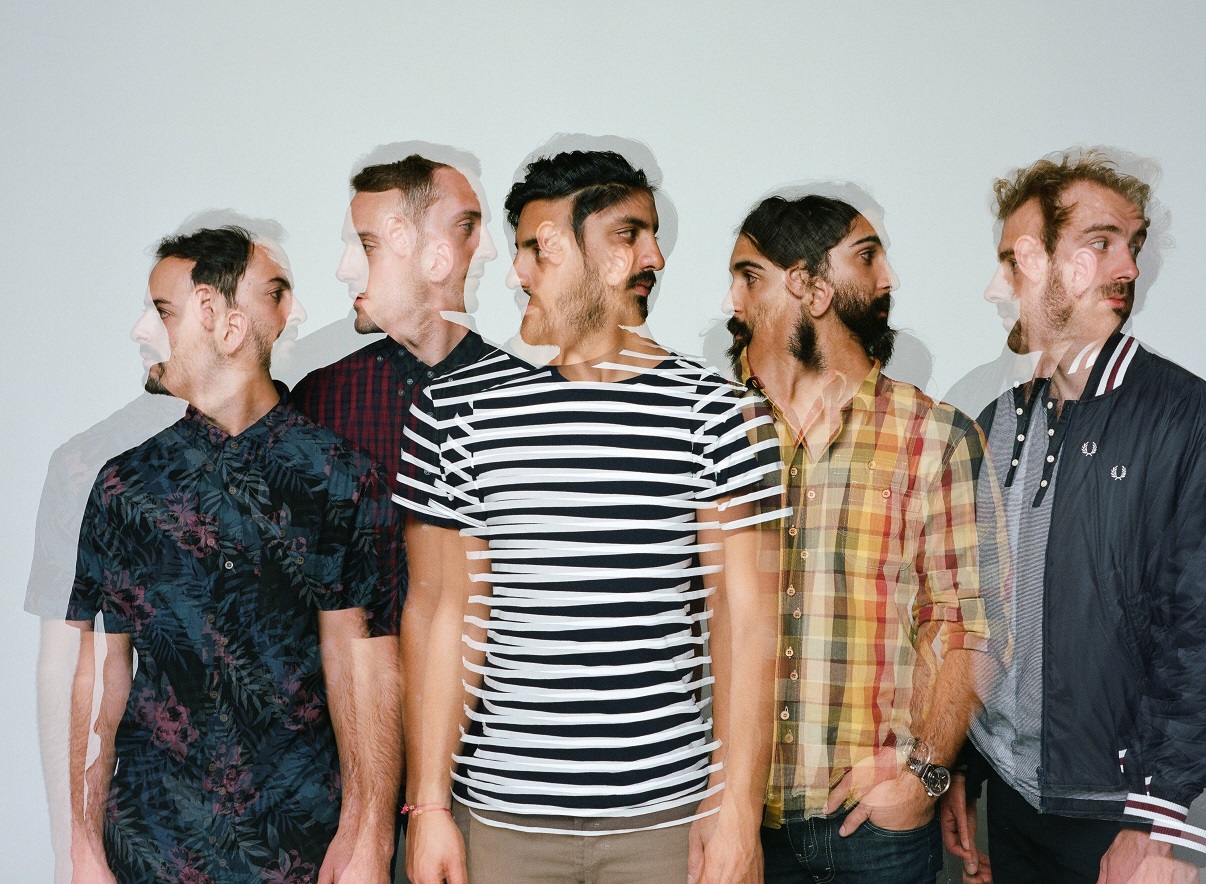
There are going to be those kids who are going to look at you a little bit differently because you’re not like them.
Were people off-put at first when they met Young the Giant? Did you ever sense that?
Gadhia: No, I don’t think so.
That's good.
Gadhia: There are always these snide remarks, like “Oh, wow. I didn’t know that you were brown; I thought you were some white guy from England!” That happens a lot, but it wasn’t really an issue. In the last year or two, it’s become obviously more of a conversation. People will bring it up. In Holland or in Italy, they’re like, “Do people treat you differently outside because of what you look like?” So I become more aware. Had I always stayed in Southern California, in Los Angeles, and in San Francisco, I might not have been as aware. I don’t think a lot of kids are.
I think your album forces the conversation now, too.
Gadhia: Yeah, exactly.
Are you excited for this upcoming tour, for that reason?
Gadhia: Yeah, I’m really excited to bring it out there and to see. It’s a conversation, and we wear it on our sleeves, so… I’m interested in seeing where that conversation leads.
— —

Follow Young the Giant on Facebook, Twitter, Instagram
Discover more new music on Atwood’s Picks
:: Young the Giant Tour 2016 ::
* w/ Ra Ra Riot
Sep 29: The Pageant, St. Louis, MO*
Sep 30: Power & Light District, Kansas City, MO*
Oct 02: Austin City Limits, Austin, TX
Oct 04: Iron City, Birmingham, AL*
Oct 05: House Of Blues, New Orleans, LA*
Oct 09: Austin City Limits, Austin, TX
Oct 18: House Of Blues, San Diego, CA*
Oct 19: House Of Blues, San Diego, CA*
Oct 21: Greek Theatre, Los Angeles, CA*
Oct 22: Fox Theater, Oakland, CA
Oct 24: Ace Of Spades, Sacramento, CA*
Oct 26: Commodore Ballroom, Vancouver, Canada*
Oct 27: Commodore Ballroom, Vancouver, Canada*
Oct 28: Showbox Sodo, Seattle, WA*
Oct 29: Irvine Meadows, Irvine, CA*
Oct 30: Irvine Meadows, Irvine, CA*
Nov 1: Ogden Theatre, Denver, CO*
Nov 2: Ogden Theatre, Denver, CO*
Nov 4: Aragon Ballroom, Chicago, IL*

